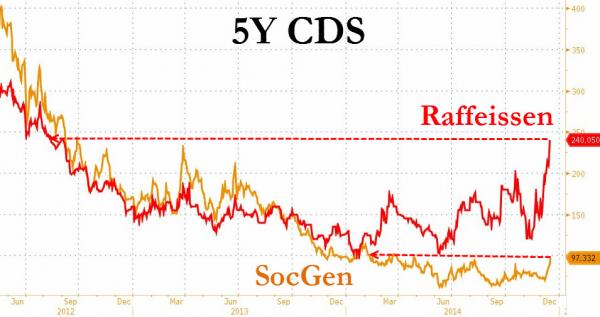We recently noted the rise of counterparty risks in the financial system due to oil prices dropping (and leveraged derivative exposures) but as the Russia situation has deteriorated so dramatically this week, a renewed focus on bank exposures has sent stocks reeling (and credit risk soaring) among many European (and US) banks. As Bloomberg reports, Raiffeisen Bank International and Societe Generale, the European banks with most at stake in Russia, led European lenders lower. Raiffeisen fell as much as 10.3% to 11.40 euros in Vienna, the lowest level since it went public in 2005. Societe Generale dropped as much as 7.3% to 31.85 euros, hitting the lowest intraday level since August 2013. CDS markets for both also exploded with Raffeisen risk at 27 month highs. As one analyst noted, “There remains a huge amount of uncertainty at this juncture, but the key point is that there are no benign scenarios.” While not on the same scale, US bank risk has also widened signicantly in recent weeks (despite equity strength).
Credity risk is surging…

As Bloomberg reports
“More fundamental concerns are building over the outlook for Russia’s economy and the likely policy response,†Neil Shearing, an economist at Capital Economics in London, wrote in a note to clients. “There remains a huge amount of uncertainty at this juncture, but the key point is that there are no benign scenarios. Even if the ruble does stabilize over the coming weeks, the economic crisis facing Russia has much further to run.â€
Societe Generale is the bank that has the biggest absolute exposure to Russia, at 25 billion euros ($31 billion), according to Citigroup Inc. analysts led by Kinner Lakhani. That’s equivalent to 62 percent of the Paris-based bank’s tangible equity. Raiffeisen has 15 billion euros at risk in Russia, almost twice its tangible equity, and it also has the biggest exposure to Ukraine, with 4.9 billion euros, according to Citigroup.
UniCredit, the third European bank strongly invested in the former Soviet Union, has 18 billion euros at stake in Russia, or 40 percent of its tangible book value, Citigroup said.

